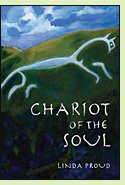Chariot of the Soul
by Linda Proud
Reviewed by Margaret Tomlinson

Chariot of the Soul imagines the life of the first-century British prince Togidubnus,
who may have been the ruler for whom the Fishbourne palace at Chichester was
built. Although few specifics of his life are known, historical and
archaeological evidence of his time underpins this richly atmospheric novel.
As portrayed here, Togidubnus is sent to Rome as a child hostage, where he grows up
in the future emperor Claudius's household. As a young man, he returns to
Britain ahead of Claudius's invasion force to urge British kings to support
Rome. Long-standing economic ties and Rome's overwhelming military power persuade
many British tribes to accept Roman rule, while a fragmented resistance effort
led by Caratacus is doomed to fail.
Central
to the story is the tension between the secularized Roman world in which the enforced
worship of emperors undermines religious belief, and the mystical
world of the Britons in which divinities are understood to inhabit springs,
lakes and rivers, groves, hills and valleys―essentially every part of the land.
Togidubnus's studies with the Roman philosopher Seneca teach him a detachment
that ripens into mysticism after he returns to Britain, meets druids and remembers
his mother's teachings. He comes to believe "that the gods of place are
the place, are what makes it shimmer with beauty. They are the liquidity of
water, the heat of the fire, the sap of the tree, the scent of the earth."
The
dangers threatening Togidubnus, both in Rome and in Britain, are serious enough
to keep readers hooked, but Chariot of
the Soul is essentially a novel of character and ideas, both philosophical
and spiritual. Its style recalls some of the finest novels about ancient Britain,
from Rosemary Sutcliff's Sword at Sunset
to Mary Stewart's Merlin trilogy—but with
the benefit of further decades of archaeological findings to draw on. Readers hungry
for more novels of that high quality will find Chariot of the Soul a worthy successor. (2018, 478 pages including
a Historical Note)
Other historical novels set in ancient Britain:
Sword at Sunset by Rosemary Sutcliff (1963), a realistic imagining of the British war leader who might have inspired the King Arthur legends. More info
The Crystal Cave by Mary Stewart (1970), about King Arthur's enchanter Merlin; #1 in the Merlin trilogy. More info
Skin by Ilke Tampke (2016), historical fantasy about a foundling girl in Britain shortly before the Roman invasion. More info
Nonfiction about Britain at the time of the Roman conquest:
Iron Age Communities in Britain by Barry Cunliffe (1974, third edition 1991). More info
Rome Against Caratacus: The Roman Campaigns in Britain, AD 48-58 by Graham Webster (1981, revised edition 1993). More info
The Roman Invasion of Britain by Graham Webster (1980, revised edition 1993). More info
Fishbourne Roman Palace by Barry Cunliffe (1998). More info
Online:
Tiberius Claudius Cogidubnus at Wikipedia
Back to Novels of Ancient History
Back to Directory of Book Reviews